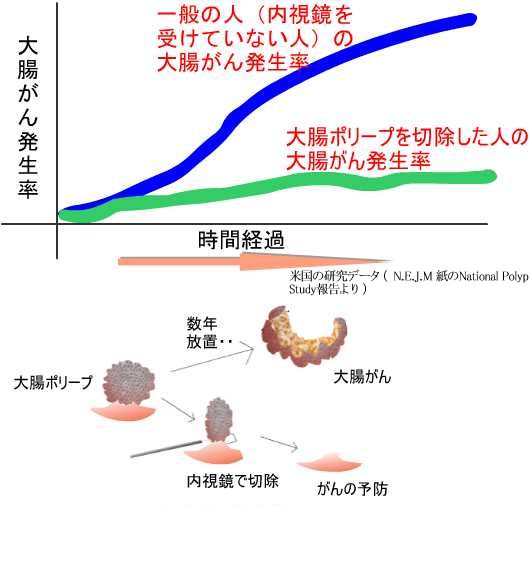|
N Engl J Med 1993 Dec 30;329(27):1977-81 Prevention of colorectal
cancer by colonoscopic polypectomy. The National Polyp Study Workgroup.
BACKGROUND. The current practice of removing adenomatous polyps
of the colon and rectum is based on the belief that this will prevent
colorectal cancer. To address the hypothesis that colonoscopic polypectomy
reduces the incidence of colorectal cancer, we analyzed the results
of the National Polyp Study with reference to other published results.
METHODS. The study cohort consisted of 1418 patients who had a complete
colonoscopy during which one or more adenomas of the colon or rectum
were removed. The patients subsequently underwent periodic colonoscopy
during an average follow-up of 5.9 years, and the incidence of colorectal
cancer was ascertained. The incidence rate of colorectal cancer
was compared with that in three reference groups, including two
cohorts in which colonic polyps were not removed and one general-population
registry, after adjustment for sex, age, and polyp size. RESULTS.
Ninety-seven percent of the patients were followed clinically for
a total of 8401 person-years, and 80 percent returned for one or
more of their scheduled colonoscopies. Five asymptomatic early-stage
colorectal cancers (malignant polyps) were detected by colonoscopy
(three at three years, one at six years, and one at seven years).
No symptomatic cancers were detected. The numbers of colorectal
cancers expected on the basis of the rates in the three reference
groups were 48.3, 43.4, and 20.7, for reductions in the incidence
of colorectal cancer of 90, 88, and 76 percent, respectively (P
< 0.001). CONCLUSIONS. Colonoscopic polypectomy resulted in a lower-than-expected
incidence of colorectal cancer. These results support the view that
colorectal adenomas progress to adenocarcinomas, as well as the
current practice of searching for and removing adenomatous polyps
to prevent colorectal cancer
内視鏡的ポリープ切除による大腸ガンの予防 全国ポリープ臨床研究会 ニューイングランドジャーナル誌
研究背景:現在われわれが大腸ポリープを切除しているのはこれが大腸ガンの予防になるだろうという信念にもとづいたものである。内視鏡的ポリープ切除が大腸ガンを減少させるという仮説を証明するため、今回われわれは全国ポリープ臨床研究会のデータを他の発表ずみデータと比較検討した。
研究方法:大腸内視鏡にてポリープを切除された1418人を過去にさかのぼって解析した。患者はその後定期的に内視鏡を受けた。平均観察期間は6年でその間の大腸ガン発生率を調べた。大腸ガン発生率を3つのグループと比較した。ポリープが見つかっても切除しなかったグループ2つと検査を行っていない一般人グループ1つを年齢、性別、ポリープサイズをマッチさせて比較の対象とした。
結果:観察期間中、ポリープを切除されたグループでは大腸ガンは5人みつかった。ポリープが見つかっても切除しなかったグループ2つでは48人と43人の大腸ガンがみつかった
。検査を行っていない一般人グループでは21人の大腸ガンがみつかった。これより内視鏡的ポリープ切除による大腸ガンの予防効果は90〜88〜76%と計算された。
結論:この研究結果は大腸ポリープが大腸ガンにかわるという説を支持するものであり、内視鏡的ポリープ切除による大腸ガンの予防の正当性を示すものである
|





